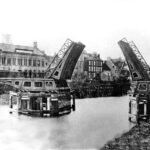28 January 1069: In the first major northern battle after Hastings, Tynesiders slaughter a Norman army at Durham, whereupon William the Conqueror ravages the north
James Ingram, Ed. 1823. The Saxon Chronicle. London: Longman, Hurst, Rees, Orme, and Brown. What we now call The Anglo-Saxon Chronicle Get it:
.Unedited excerpt
If an excerpt is used in the book, it will be shorter, edited and, where applicable, translated.
A.D. 1068. This year King William gave Earl Robert the earldom over Northumberland; but the landsmen attacked him in the town of Durham, and slew him, and nine hundred men with him. Soon afterwards Edgar Etheling came with all the Northumbrians to York; and the townsmen made a treaty with him: but King William came from the South unawares on them with a large army, and put them to flight, and slew on the spot those who could not escape; which were many hundred men; and plundered the town. St. Peter’s minster he made a profanation, and all other places also he despoiled and trampled upon; and the etheling went back again to Scotland. After this came Harold’s sons from Ireland, about midsummer, with sixty-four ships into the mouth of the Taft, where they unwarily landed: and Earl Breon came unawares against them with a large army, and fought with them, and slew there all the best men that were in the fleet; and the others, being small forces, escaped to the ships: and Harold’s sons went back to Ireland again.
A.D. 1069. This year died Aldred, Archbishop of York; and he is there buried, at his see. He died on the day of Protus and Hyacinthus, having held the see with much dignity ten years wanting only fifteen weeks. Soon after this came from Denmark three of the sons of King Sweyne with two hundred and forty ships, together with Earl Esborn and Earl Thurkill, into the Humber; where they were met by the child Edgar, and Earl Waltheof, and Merle-Sweyne, and Earl Gospatric with the Northumbrians, and all the landsmen; riding and marching full merrily with an immense army: and so all unanimously advanced to York; where they stormed and demolished the castle, and won innumerable treasures therein; slew there many hundreds of Frenchmen, and led many with them to the ships; but, ere that the shipmen came thither, the Frenchmen had burned the city, and also the holy minster of St. Peter had they entirely plundered, and destroyed with fire. When the king heard this, then went he northward with all the force that he could collect, despoiling and laying waste the shire withal; whilst the fleet lay all the winter in the Humber, where the king could not come at them. The king was in York on Christmas Day, and so all the winter on land, and came to Winchester at Easter. Bishop Egelric, who was at Peterborough, was this year betrayed, and led to Westminster; and his brother Egelwine was outlawed. This year also died Brand, Abbot of Peterborough, on the fifth before the calends of December.
Comment
Comment
Frank Stenton (Stenton 2004) and Thomas Forester in his edition of Ordericus Vitalis (Ordericus Vitalis 1854) give the same date for the Durham massacre, but I don’t know where they found it. Orderic is more interesting and complete and should probably replace the Anglo-Saxon Chronicle here.
Something to say? Get in touch
Similar
 25 September 1066: The Stamford Bridge massacre by Harold Godwinson’s army of Harald Hardrada and Tostig Godwinson’s force – symbol of the end of the Viking Age
25 September 1066: The Stamford Bridge massacre by Harold Godwinson’s army of Harald Hardrada and Tostig Godwinson’s force – symbol of the end of the Viking Age 1 July 1840: The opening of the Hull and Selby Railway terminates the threat to Hull’s port from Goole, Scarborough and Bridlington
1 July 1840: The opening of the Hull and Selby Railway terminates the threat to Hull’s port from Goole, Scarborough and Bridlington 19 October 1816: Serenaded by the military, decorated barges leave Leeds for Liverpool to celebrate the completion, after almost 50 years, of the canal uniting east and west
19 October 1816: Serenaded by the military, decorated barges leave Leeds for Liverpool to celebrate the completion, after almost 50 years, of the canal uniting east and west
Comment
Comment
A letter written Tuesday 6 July 1858 describes the real-life events of Sunday 4:
“Here I am still (after having been to church at Horton in Ribblesdale). All that I have heard of the grandeur of Godale Scar and Malham Cove, was, I found, not exaggerated. The awful cliff filling up the valley with a sheer cross wall of 280 feet, and from beneath a black lip at the foot, the whole river Air coming up, clear as crystal, from unknown abysses. Its real source is, I suppose, in the great lake above, Malham Tarn, on which I am going to-morrow. The fishing is the best in the whole earth. Last night we went up Ingleborough, 2380, and saw the whole world to the west, the lake mountains, and the western sea beyond Lancaster and Morecambe Bay for miles. There was a cap on Scawfell forty miles away which has ended in heavy rain to-day. The people are the finest I ever saw-tall, noble, laconic, often very handsome. Very musical too, the women with the sweetest voices in speech which I have ever heard. I trust Rose has got her letter; I sent it down to Settle by a man (Kingsley 1878).
Something to say? Get in touch
Search
Donate
Music & books
Place-People-Play: Childcare (and the Kazookestra) on the Headingley/Weetwood borders next to Meanwood Park.
Music from and about Yorkshire by Leeds's Singing Organ-Grinder.


 Bluesky
Bluesky Extwitter
Extwitter